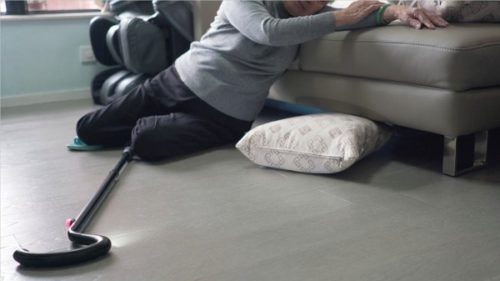Loss of balance, it turns out, is not just a problem for the oldest of old. Instead — like strength, agility and muscle mass — balance tends to start declining in midlife, that’s right at age 40 to 65. We think of it as an older person’s problem because we see the oftentimes devastating end results of older people falling and possibly damaging a hip. But the subtle changes that begin earlier can affect everything from athletic performance to the ability to easily rise from a chair.
About one-third of the elder population over the age of 65 falls each year, and the risk of falls increases proportionately with age. At 80 years, over half of seniors fall annually. Those who fall are two to three times more likely to fall again. Falls are the leading cause of death due to injury among seniors and 87% of all fractures seen in them are due to falls.
If you have a disease called osteoporosis, you are more likely to break a bone if you fall. Osteoporosis is called the “silent disease” because bones become weak with no symptoms. You may not know that you have it until a strain, bump, or fall causes a bone to break. If a person with osteoporosis falls and breaks a bone, their recovery time will be lengthy.
Falling can be really scary for so many folks across the board but those who are afraid, tend to fall! If there are no medical issues that need to be addressed, here are a few tips from the National Institute of Arthritis and Musculoskeletal and Skin Diseases on how to prevent falling indoors and out:
- Use a cane or walker
- Wear rubber-soled shoes so you don’t slip
- Walk on grass when sidewalks are slick
- Put salt or kitty litter on icy sidewalks.
Some ways to help prevent falls indoors are:
- Keep rooms free of clutter, especially on floors
- Use plastic or carpet runners
- Wear low-heeled shoes
- Do not walk in socks, stockings, or slippers
- Be sure rugs have skid-proof backs or are tacked to the floor
- Be sure stairs are well lit and have rails on both sides
- Put grab bars on bathroom walls near tub, shower, and toilet
- Use a non-skid bath mat in the shower or tub
- Keep a flashlight next to your bed
- Use a sturdy step stool with a handrail and wide steps
- Add more lighting in rooms
- Buy a cordless phone so that you don’t have to rush to the phone when it rings and so that you can call for help if you fall.
You can also do exercises to improve your balance. While holding the back of a chair, sink, or counter:
- Stand on one leg at a time for a minute and then slowly increase the time. Try to balance with your eyes closed or without holding on.
- Stand on your toes for a count of 10, and then rock back on your heels for a count of 10.
- Make a big circle to the left with your hips, and then to the right. Do not move your shoulders or feet. Repeat five times.
If you fall and cannot get up, follow the steps below.
- If you feel as though you will be heard, call out for medical assistance.
- If you have a fall prevention lanyard, take it out to serve as identification. Use your cell phone to call for assistance if you have it on hand and you can reach it without straining yourself.
- If you do not have your cell phone or emergency call device on hand, slide yourself to the nearest phone or bench.
- Make as much noise as possible to draw attention to your situation. Use your walking implement if you need to.
- Get into a comfortable, safe position and wait for help. Make sure to protect your joints.
If any of the following things take place as a result of a fall, call your physician immediately: lingering pain, dizziness, nausea, weakness, loss of consciousness, any visually apparent injury, drowsiness, headache, or vision problems. These symptoms may appear in the days after a fall or immediately afterward. A doctor should be called in either situation.
